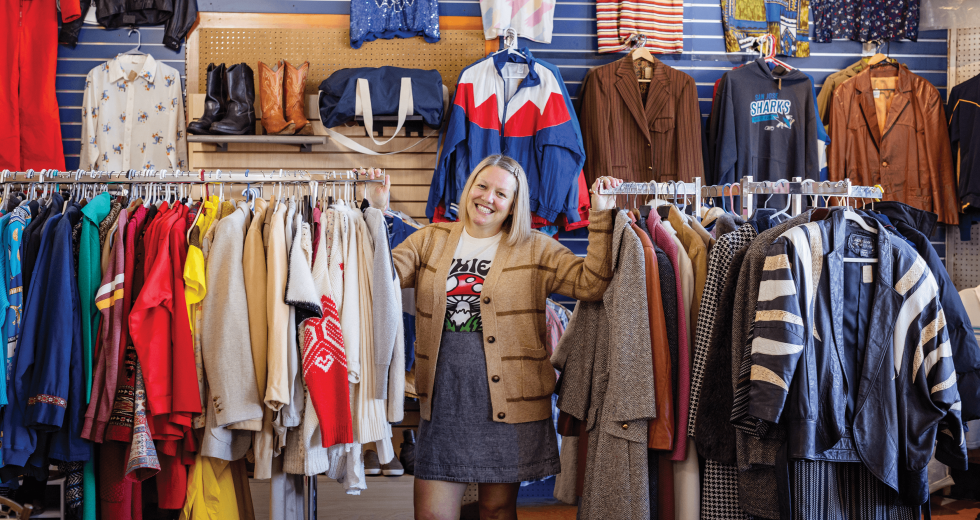Vanessa Van Vleck keeps a wall of shame at Superbum Plant Company, identifying people suspected of stealing from her East Sacramento store.
It’s one of the few things Van Vleck and her husband, Dylan Van Vleck, who opened their business in 2021, can do to deal with a burgeoning problem in California.
Retail theft has risen in recent years, with the National Retail Federation reporting $94.5 billion in lost or damaged goods for businesses in 2021. California’s getting particularly hit. While localized data is hard to come by on retail theft, Sacramento’s one of a few major population centers in California ranking in the top 10 nationally for organized retail theft.
Around the state, thieves engage in everything from petty shoplifting to larger, more sophisticated rings that travel throughout California and sometimes operate multinationally. While Gov. Gavin Newsom, the California Highway Patrol and others have been increasing enforcement, there’s still much progress to be made.
Major retailers might get headlines as giants like Macy’s face flash mobs of thieves and Nordstrom leaves downtown San Francisco. But it’s small businesses like Van Vleck’s that bear the brunt of the current climate around retail theft.
“For every big retailer that is talking about it, there are multiple small retailers who are being hit just as bad,” says Rachel Michelin, president of the California Retailers Association.
What retail theft looks like in the Capital Region
At Old Sacramento novelty shop Evangeline’s, owner Deborah Chausse, her staff and security guards grapple with a serious problem around retail theft.
“It’s just terrible, it really is, especially because it’s being popularized in social media,” Chausse says. “People see how criminals can just grab things and run out of the store.”
Thefts can be brazen. Roseville Galleria and its parent company, Unibail-Rodamco-Westfield, declined to be interviewed, though KCRA 3 had a video in 2022 showing thieves smashing cases at a jewelry store at the mall. CHP Lt. Jason Blankenship says the Roseville Galleria remains one of the Sacramento region’s hotspots for retail crime.
“I think a lot of what you’re seeing, like let’s say Arden Fair and the Roseville Galleria, it’s because they contain these big stores that we see that are most frequently hit, like Ulta and Target,” Blankenship says.
Andy Soloman, assistant chief deputy district attorney for Sacramento County, says the region is ranked seventh nationally for organized retail theft. Brian Vavera, an investigator for the office, attributes the region’s ranking partly to Sacramento’s proximity to Los Angeles and San Francisco, which rank highest.
“A lot of the organized retail crime, they travel around,” Vavera says. “They don’t just stay in one area.”
Smaller area businesses face audacious theft attempts, too. At Superbum, a woman walked in wearing only underwear and a bra. She attempted to leave wearing suede moccasins, a vintage dress, leather belt and jean jacket. Dylan Van Vleck interceded, letting the woman leave with everything except the belt. He did this both out of compassion and because the woman’s pungent body odor made the items unsellable.
Businesses get hit in different ways. Stefan Bloom generally doesn’t worry much about anyone stealing from his Midtown shop, Scout Living. But earlier this year, someone stole his pug Tatty from in front of the store. Bloom suspects a disturbed person took Tatty, who was soon safely recovered. He calls the incident “an indictment of the fraying social safety net.”
The NRF also notes that 71.4 percent of retailers say theft by employees has increased as a result of the pandemic.
It’s not to say all retail thieves in the region are either employees, organized criminals or destitute. Chausse says Evangeline’s apprehends many minors. The store calls their parents, the kids get in trouble and it becomes a teachable moment.
“Lately, the change that is happening is that we’ll get these more serious criminals who will just walk out,” Chausse says. “They don’t conceal the product. I mean, they’re not trying to even hide it.”
How things reached this point
Michelin has been making the rounds with national news outlets for two-and-a-half years. “We had issues with organized retail crime prior to the pandemic,” Michelin says. “I don’t think it was getting as much of the media attention as it is now.”
Some of the increased attention might be because a marginal increase in crime has been quantifiable in California in recent years. Between 2021 and 2022, burglaries rose 6.17 percent, larceny-theft increased 7.65 percent and robberies soared by 10.7 percent, according to the California Department of Justice.
Rachel Michelin is president of the California Retailers
Association. Her agency has secured funding for Organized Retail
Crime task forces to fight retail theft.

Increased crime has also been felt locally in the Sacramento area. John Kabateck, California director for the National Federation of Independent Business, cited Sacramento Police Department statistics that state property crimes rose 16.9 percent for the first five months of 2022. Kabateck says his members call asking for more funding and support for local law enforcement.
“They’re eager to make sure they don’t fault local police officers or sheriffs in their communities for not showing up,” Kabateck says. “They’re asking for more of them.”
The appetite for more enforcement could be only the latest shift in public sentiment in California, a state that has seesawed between tough-on-crime approaches and progressive criminal justice reform in recent decades.
In 2014, nearly 60 percent of voters approved Proposition 47, a landmark reform which included making shoplifting less than $950 of goods a misdemeanor rather than a felony and eliminated making petty theft a felony for people with prior convictions. While the initiative might have been a well-intended effort to reduce prison overcrowding and draconian sentencing, some businesses, trade groups and policymakers cite Prop. 47 as part of what’s fueling retail theft.
“Prop. 47 has been one of the most impactful issues that urban centers in California have faced,” says Michael Ault, executive director for the Downtown Sacramento Partnership. “It’s created a level where there’s limited accountability and consequences.”
Matt Hilbrink, Raley’s vice president of enterprise risk and asset protection, says the grocery store chain has always had shoplifting. Since Prop. 47’s passage, however, Hilbrink says that “what traditionally would have been a shoplifter is now pushing out a cart of groceries or is targeting an entire section of health and beauty.”
Thefts don’t always occur without violence either, with Hilbrink saying, “Our team members have been physically assaulted.”
Amanda Blackwood, CEO of the Sacramento Metropolitan Chamber of Commerce, says she’s heard from retailers about groups of people that hit their locations.
“They’ll come every three, four days,” Blackwood says. “They’ll grab a bag of things, and they know very clearly no one’s going to come. We’ve heard from our businesses that they’ll call the police, they’ll say what’s going on. If there’s not an active armed robbery or something that’s going on that’s overtly violent like that, it’s simply just supply theft, materials theft, they have been told, ‘We’re not coming for that.’”
A spokesperson for the Sacramento Police Department declined to make anyone available for an interview.
There has been some movement in the legislature in recent years to tackle the problem. Assembly Bill 1065 from Assemblyman Reggie Jones-Sawyer of Los Angeles passed in 2018, adding section 490.4 to the California Penal Code and creating the CHP’s retail theft task force.
Jones-Sawyer noted in an Aug. 15 press release that the task force was credited in 2022 “with conducting 1,296 investigations, netting 645 arrests and roughly $26 million in recovered merchandise.”
With retail theft continuing, other attempts to reform Prop. 47 have been hitting roadblocks.
What’s being done to stop retail theft
A 2022 poll by the UC Berkeley Institute of Governmental Studies found that 59 percent of voters supported changing Prop. 47 to make the way for more felony prosecutions. Still, reform has proven to be a tall task for Republican and Democratic lawmakers alike.
“The most frustrating element of these past couple of years is that while Rome is burning, our policymakers continue to fiddle,” Kabateck says.
Republican Sen. Roger Niello of Fair Oaks authored Senate Bill 316, which would have mandated jail time for a fourth conviction of retail theft. The Senate Committee on Public Safety voted 3-1 on March 28 to kill the bill. “I knew there would be resistance to it, which of course there was,” Niello says.
Republican Assemblyman Josh Hoover of Folsom had a nearly identical bill to Niello’s, Assembly Bill 75. The bill died in the Assembly Public Safety Committee. “The more radical groups hold a lot of power in the Public Safety Committee,” Hoover says.
Aisha Wahab, who chairs the Senate Public Safety Committee, and Jones-Sawyer each weren’t available for interviews following requests.
It’s not just Republicans falling short with Prop. 47 reforms. The Assembly Public Safety Committee voted 4-2 in April to kill Assembly Bill 1708 from Democrat Al Muratsuchi of Torrance, which would have allowed for felony charges for people with a third conviction for shoplifting or petty theft. The bill also would have allowed for diversion programs in some cases.
“We don’t want to go back to the bad, old days of mass incarceration,” Muratsuchi says. “But at the same time, we need to balance that by targeting repeat, chronic criminal offenders.”
Others like Michael Ault with the Downtown Sacramento Partnership are less sympathetic. “I don’t know why we have gotten to the point where we’re afraid to hold people accountable for bad behavior,” Ault says.
Prop. 47 reform might take more than the legislature. Michelin says Sacramento attorney Thomas Hiltachk, who didn’t respond to a request for comment, is working on a potential ballot measure for 2024 or 2026.
In the meantime, businesses are left to pursue their own strategies around deterring retail theft.
Michelin notes a Walgreens in Chicago that has just a handful of products on display and otherwise has customers order goods that are dispensed from a vending machine-like system. She sees the potential for similar setups in California, saying, “We can absolutely get to that point if we can’t get a handle on it, which I think is sad.”
Hilbrink says Raley’s is providing enhanced safety training for staff, including how to communicate with law enforcement and stay safe during an incident.
Across from Evangeline’s, Stage Nine Entertainment & G.Willikers! Toy Emporium has installed a new security camera system and hired uniformed security for weekend nights, Evangeline’s owner Chausse says.
A block away, Howard Skalet hasn’t had a reported theft in years at Skalet Family Jewelers. But he keeps items like rings in locked cases and closely watches people who enter his store. He also has protocols in place for his employees. “I come into work every single day prepared, planning for the best and prepared for the worst,” Skalet says.
Back at Superbum, aside from the wall of shame, Van Vleck has a warning for would-be thieves: They’ll be blasted on social media. These posts are popular, even leading to increased business for sellers who rent space at Van Vleck’s shop, she says.
“So many other people come in and go, ‘You know what? I was thinking about this ring. I’m just gonna do it now to support you.’”
Stay up to date on business in the Capital Region: Subscribe to the Comstock’s newsletter today.
Recommended For You

The Evolution of Leadership Styles
Several factors, including lockdown and generational differences, influence managers
The pandemic, the rise of Gen Z and new cultural norms have all contributed to a shift in the values we expect from modern leaders. Understanding these trends — and the strategies required to keep up — is crucial for any leader who wants to retain employees, inspire their best work and even continue their own career.

The Wage of Innocence?
Comstock’s president and publisher reflects on minimum wage and the value of work.

Running a Family Business in California Isn’t Easy
But local organizations are here to help
The line from “The Godfather,” “It’s not personal, it’s strictly business,” does not apply to the members of a family business. For us, there are a wide range of emotions that start at an early age as we realize that we are part of something that consumes our parents’ time, including conversations at dinner and the holidays.

A Piece of the Pie
Family business spotlight: The Fruit Bowl has been providing peaches and more to Stockton for 76 years
Over the course of summer and the first weeks of fall, over 60 varieties of peaches and nectarines pass through The Fruit Bowl, a 76-year-old produce stand on the rural outskirts of Stockton.




